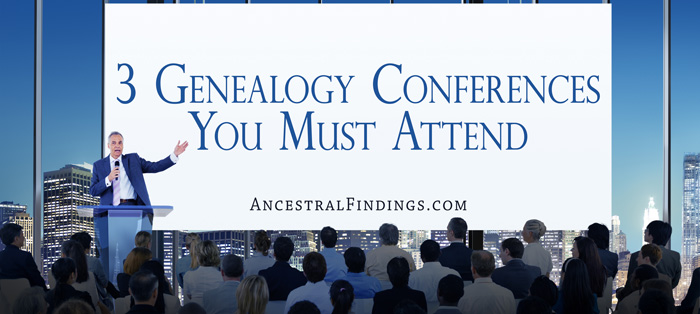Have you ever attended a genealogy conference? You have probably seen notices for them, either online or in-person if you have been doing genealogy research for even a short amount of time. They are given at the local, regional, and national levels, and can be small online gatherings or large groups in hotel ballrooms. Conferences can also range from a talk on one genealogical topic alone, or events that tackle many genealogical subjects in a series of workshops. If you have ever wondered if attending these conferences is worth your while as a genealogist, here is what you need to know about them.
What Level of Researcher are You?
Are you a beginning genealogist? Someone with moderate experience? Or, are you an expert with decades in the field behind you? Regardless of your level of experience, there is a genealogical workshop out there for you — even the experts among you. No one is so experienced that there is nothing new for them to learn, after all.
When looking at genealogical workshops, take your level of experience into consideration against what the workshop is offering. It will not do you any good to go to a beginner’s conference if you already have quite a bit of experience. Likewise, you are wasting your time and will only become confused if you attend a high-level conference for experienced genealogists if you are a beginner.
Look for conferences that match your skill level. For smaller conferences, this might involve a talk on just one topic, while large conferences may have a mix of workshops for genealogists of all skill levels. When you find one that matches your skill level, look further into what the workshop is offering. Is it something you need or want to learn? Then, attending is a great idea, and you will probably come away with at least one useful thing out of it, and probably several new techniques or resources you can use.
What Do You Want to Learn?
Different conferences teach different things. Before signing up for one, go over the schedule carefully. What, exactly, are they teaching, and is it something you need or want to learn, that will make you a better researcher? Is it a topic that will interest you? There is no point in going if you will be bored. However, if there is at least something that may be of interest to you or help you with your research, it is well worth considering attending.
With single-topic workshops, you should be able to decide at a glance if the topic is for you. At large conferences with a variety of workshops being offered, you may find that some workshops are not for you, but some are. You can confidently go to the conference, attend only the workshops that intrigue you, and come away feeling like it was time well spent in furthering your genealogical endeavors. If you learn something, you will be happy you went, so make sure there is something being offered for you to learn.
Do You Mind Traveling?
Most small, one-topic genealogical workshops are held at the local level and should be simple for you to attend. However, unless your city is chosen to be a host for a large genealogical conference, you will probably have to travel at least a short distance to go to one (and maybe a long-distance). Are you willing to travel? And, if you are, how far are you willing to go? It will all depend on how much the information being offered at the conference is worth to you. This is a personal decision, but you will know whether or not you want to make the journey when you peruse the conference schedule.
Also, keep in mind that most local, single-topic workshops are geared toward beginners, and sometimes intermediate-level genealogists. The large, multi-workshop conferences are typically geared toward intermediate to highly skilled genealogists. So, your skill level will usually influence how far you must travel to get the information you seek. It is not always this way, but it is the general rule when it comes to genealogy conferences. If you become skilled enough, you may even find yourself being asked to give a one-topic local workshop to beginners.
How Much Time and Money Do You Have to Spend at a Conference?
Small, single-topic workshops are usually for just a few hours on a morning or evening, and are either free or only cost a nominal fee. These are the easiest to attend for obvious reasons, but if you are skilled beyond the level of the workshop, it might be useless for you to attend it, especially if you know the topic well enough you could be teaching it. It is true that beginning genealogists usually spend much less time and money on conferences than those with higher levels of skill, just because of the nature of genealogical conferences.
The larger conferences for more skilled researchers can last an entire long weekend, and cost much more than a local conference. You also have to factor in the costs of getting there and back home, and of acquiring accommodations during your stay at the site of the conference.
Do you have three to four days to spend at a genealogical conference that offers dozens of workshops for all skill levels and on all kinds of intriguing topics? Do you have the money to do it, taking travel, hotel, and food into consideration in addition to the conference’s entrance fee? Do you have money in your budget to buy products and services from the vendors who will be in the vendor’s hall between workshops (because there will almost certainly be at least a few things you discover there that you need)?
If you can answer “yes” to all of these questions, then the conference will not only be doable for you, it will be a joy for you to attend.
There is plenty you can get out of a genealogical conference, and you should definitely go to at least one (and ideally several). Just know what you are going to, what it offers, what your own skill level is and research objectives are, and budget accordingly. When everything falls into place, genealogical conferences are a crucial part of being the best genealogist you can be.


